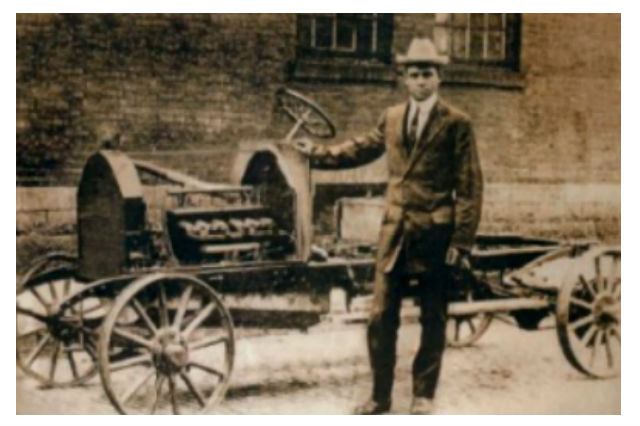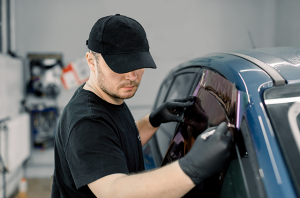Charles Richard Patterson may not be a household name in transportation history, but he and his son Frederick successfully carved out an important place for themselves at the dawn of the automobile age. We take a look at how these automotive pioneers left their mark on both American and black history.
C.R. Patterson was born a slave in Virginia in 1833. Years later, according to the African American Registry, he escaped, traveling over the Allegheny Mountains, through West Virginia and across the Ohio River. He settled in Greenfield, Ohio, a town with strong abolitionist sympathies and a station on the Underground Railroad.
Once in Ohio, Patterson learned blacksmithing skills and went to work for a carriage-making business. In 1873, he formed a business partnership with another local carriage manufacturer named J.P. Lowe. For the next 20 years, the duo ran a successful business making expertly crafted horse-drawn carriages.
In 1893, Patterson bought out Lowe and became the sole proprietor of the newly renamed C.R. Patterson & Sons. When he died in 1910, Patterson passed the flourishing business to his son Frederick. The younger Patterson was already a pioneer, becoming the first African American to play football for Ohio State University.
The change of hands occurred just has the transportation business was being revolutionized. Frederick began noticing more and more “horseless carriages” on the roads and knew that automobiles were the future. C.R. Patterson & Sons produced its first car in 1915. Known as the Patterson-Greenfield automobile, it sold for $850.
More orders came in and Patterson & Sons established itself as legitimate auto manufacturer. According to the Historic Vehicle Association, the Patterson-Greenfield model was comparable in quality and workmanship to the Ford Model T. However, the Ohio company couldn’t match Ford’s manufacturing capability. In the 1920s, after producing approximately 150 cars, Patterson & Sons switched to the production of trucks, buses and other commercial vehicle bodies, which were installed on top of chassis made by major auto manufacturers.
Hit hard by the Great Depression, coupled with Frederick’s death in 1932, the company began to spiral downward. It closed in 1939. There are no known Patterson-Greenfield automobiles in existence today, but several C.R. Patterson & Sons Company carriages have survived. The National Museum of African American History & Culture states that Patterson & Sons remains the only African American-owned automobile company in United States history.
18 Thoughts on “C.R. Patterson and Sons: The First and Only African-American Automobile Company”
Leave A Comment
Comments are subject to moderation and may or may not be published at the editor’s discretion. Only comments that are relevant to the article and add value to the Your AAA community will be considered. Comments may be edited for clarity and length.
















This is an outstanding article on Black history. The “Jim Crow” era forced a lot of information to the background of American life. I find it utterly amazing that at 64 years, almost everyday there’s something new to be learned. There are stories about A/A soldiers on the beach at D-Day; there’s the Wereth 11 Massacre, where responsibility was ignored at Nuremberg, and so many more true tales about African-American involvement that has led to America’s greatness in the eyes of the world. Thank you.
Missed last year’s article too. So glad you decided to run it again!
Good read, happy I am informed.
My appreciation. I will share this.
Good to know.
Definitely a worthwhile read. Thanks.
Thanks for the historic info, missed it last year
Thank you for repeating this information. I missed last year’s and very happy to be informed. Please keep up the good work.
This is a repeat of last year on Black history now you have a whole year to find out some new information there are other interesting people out there Wow
Hi Earlene, you’re right–there are countless fascinating and important people to write about and we have new Black History Month content coming out soon that does just that. We wanted to revive this story now for those who may have missed it last year. Thanks for reading and stay tuned!
Thank you for the info. I am one of those that missed last year’s information
Thank you for this info. I’ve been a member for 2 years but haven’t read the newsletter thoroughly. I appreciate the effort and diligence. I’m a 38 yr old African American woman, and appreciate it even if it is a repeat. It’s great to get the history out there.
Very interesting. Never knew this. Thanks for the information.
This comes as quite a surprise!
Never Knew, Very Surprise
Wow isn’t it ironic that no automobiles are in circulation at all! Hum!
Ironic that none have survived? Not really… most odd or “orphan” makes of cars have a survival rate of 1% at best. With a production of only 150 cars only one or two MIGHT have survived at most. Over 200 companies have made cars in the history of U.S. auto production. Many of the almost unknown makers have no survivors.
Thank you, for re-writing this article this year. I missed it last year. Coming from Michigan home of the Big 3 Auto Makers this is information that is very surprising because their names are never mentioned in the history book that I’ve read which are many. Hats off to C.R. Patterson and Sons that was amazing. I will share this information with my grandchildren for sure. Thank you again!!!!